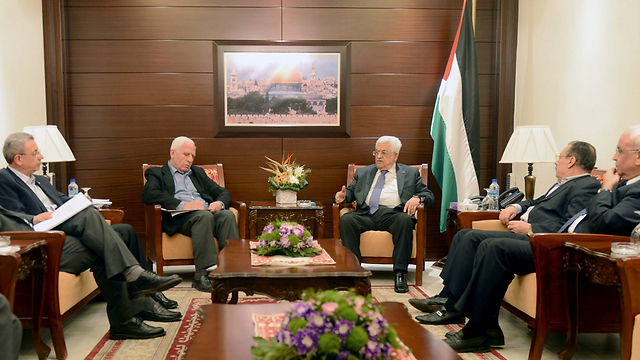
Israel said weighing sanctions on Palestinians over unity deal
Netanyahu convenes security cabinet; Lieberman accuses Abbas of 'political terror', says Hamas-Fatah agreement spells end to peace talks; US warns agreement will affect aid to Palestinians.
Israel is considering sanctions on the Palestinians in response to the Hamas-Fatah reconciliation agreement, Israel Radio reported Thursday, while Prime Minister Benjamin Netanyahu convened his inner security cabinet Thursday morning for urgent consultations on Israel's next move.
Meanwhile, Foreign Minister Avigdor Lieberman told the radio on Thursday that a peace deal with the Palestinians is impossible in the wake of a reconciliation agreement between rival Palestinian factions Hamas and Fatah, and accused Palestinian President Mahmoud Abbas of engaging in "political terror"
Lieberman said that Israel should resist pressure to resume talks with Abbas, who heads the more moderate Fatah organization, accusing him of striking the deal with the Islamist Hamas in order to thwart the ongoing peace talks with Israel. The agreement greatly complicates the US-brokered talks, which Washington is already struggling to extend past an April 29 deadline.
Wednesday's reconciliation announcement comes after a long line of failed efforts to end seven years of internal Palestinian warring, and envisions a unity government within five weeks and national elections six months later.
Israel, whose government includes ministers opposed to the creation of any Palestinian state, canceled a session of talks with the Palestinians that had been scheduled for Wednesday, and the State Department warned the unity move could derail peace efforts.
The United States reacted coolly to the announced reconciliation Thursday, saying that it would have to reconsider its assistance to the Palestinians if the deal went ahead, as Gaza-based Hamas is listed by the US as a terrorist organisation.
Related stories:
- Netanyahu: Abbas chose Hamas over peace with Israel
- Kerry says Israel responsible for peace talks crisis
- Source: Abbas doesn't want peace
"Any Palestinian government must unambiguously and explicitly commit to non-violence, recognition of the state of Israel, and acceptance of previous agreements and obligations between the parties," the US official said, listing terms Hamas has long rejected.
"If a new Palestinian government is formed, we will assess it based on its adherence to the stipulations above, its policies and actions, and will determine any implications for our assistance based on U.S. law," the official said, speaking on condition of anonymity.
Asked whether the reconciliation moves would incur US sanctions, PLO Deputy Secretary Yasser Abed Rabo told Palestinian radio it was too soon to penalise a government that had yet to be formed.
"There's no need for the Americans to get ahead of themselves over this. What happened in Gaza in the last two days is just a first step which we welcome and want to reinforce," he said.
"But this step shouldn't be exaggerated, that an agreement for reconciliation has been completely reached... We need to watch the behaviour of Hamas on many details during the coming days and weeks on forming a government and other things."
Netanyahu slammed the agreement on Wednesday, saying that, Abbas "could have chosen peace with Israel instead of peace with a murderous terror organization. Tonight, while talks are ongoing to extend peace talks, he chose Hamas… He who chooses Hamas does not want peace."
Abbas replied to Netanyahu's critical stance by saying that unity between Fatah and Hamas was strictly an internal issue and didn't need to have any effect on the two-state solution.
"There is no incompatibility between reconciliation and negotiations, especially as we are committed to a just peace based on a two-state solution in accordance with resolutions of international law," said Abbas.
Hamas, which won a Palestinian election in 2006, wrested control of the Gaza Strip from forces loyal to Abbas in 2007. Questions of sovereignty over the territory, the composition of a unity government and the future of Hamas security forces are main stumbling blocks to a unity government.
Reuters and the Associated Press Contributed to this report.











